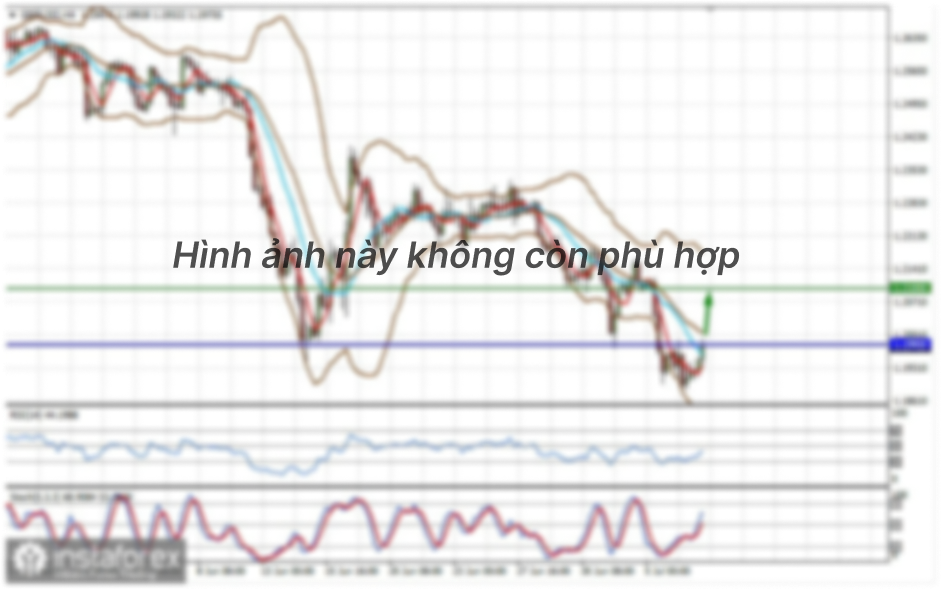To open long positions on EUR/USD, you need:
Two signals to sell the euro appeared yesterday morning. In my forecast for the first half of the day, I advised you to open short positions on the euro after an update of resistance at 1.2174, which happened. But if the bears started to become active on the initial test, and the entry point was quite inconvenient here, then returning to the 1.2174 level for the second time resulted in creating a more practical signal to sell the euro. The bulls were able to surpass 1.2174 closer to the middle of the US session, but it was not possible to wait for a convenient buy signal and test this level from top to bottom, as a result of which I missed the deal.

The bulls managed to reach resistance at 1.2224, and today they need to surpass this range in the first half of the day. Testing it from top to bottom will lead to creating a signal to open new long positions, with the goal of pushing EUR/USD to the resistance area of 1.2252. The 1.2281 high is still the long-term goal, where I recommend taking profits. European Central Bank President Christine Lagarde will speak in the first half of the day, and she can talk about the prospects for interest rates, which is likely to weigh on the euro. If this happens, and the single currency falls, then I recommend taking your time with long positions. The optimal scenario for opening longs is when the pair falls to the support area of 1.2179, where a false breakout will be a signal to buy the euro. There are also moving averages that play on the side of euro buyers. The lower boundary of the new rising channel can also be created in this range. If bulls are not active, then I recommend opening long positions immediately for a rebound from the low of 1.2138, counting an upward correction of 20-30 points within the day.
To open short positions on EUR/USD, you need:
Sellers of the euro need to protect resistance at 1.2224. Forming a false breakout there in the first half of the day will result in creating a signal to open short positions in the euro. As I mentioned above, Lagarde's speech is important. In the event of such a scenario, we can expect EUR/USD to fall to the support area of 1.2179, for which a real struggle will unfold. Strong US inflation data can bring back the demand for the dollar. However, being able to settle below 1.2179 and testing it from the bottom up will open a direct path for EUR/USD to the lows of 1.2138 and 1.2083, where I recommend taking profits. If sellers are not active in the 1.2224 area in the first half of the day, then it is best to abandon shorts and wait for an update of the new resistance at 1.2252. I recommend selling the euro immediately for a rebound after testing the high of 1.2281, counting on a downward correction of 20-30 points within the day.

The Commitment of Traders (COT) report for January 5 recorded an increase in both long and short positions. Buyers of risky assets continue to believe in a bullish trend despite the euro's decline earlier this year, which will make it possible for new major players to enter the market. News on the ongoing vaccinations against the first strain of coronavirus in Europe will also support euro buyers. Pressure on the euro will come from isolation measures and quarantines in several European countries. Thus, long non-commercial positions rose from 222,443 to 224,832, while short non-commercial positions jumped from 78,541 to 81,841. Due to the larger increase in short positions, the total non-commercial net position decreased from 143,902 to 142,991 weeks earlier. The insignificant change in the delta at the beginning of the year is unlikely to indicate a change in the tactics of euro buyers, who count on bringing back the single currency's growth after the abolition of quarantine measures in the EU countries.
Indicator signals:
Moving averages
Trading is carried out above 30 and 50 moving averages, which indicates an attempt by euro buyers to reverse the downward trend.
Note: The period and prices of moving averages are considered by the author on the H1 hourly chart and differs from the general definition of the classic daily moving averages on the D1 daily chart.
Bollinger Bands
A breakout of the lower border of the indicator in the 1.2235 area will increase pressure on the euro. In case the pair falls, support will be provided by the lower border of the indicator at 1.2130.
Description of indicators
- Moving average (moving average, determines the current trend by smoothing out volatility and noise). Period 50. It is marked in yellow on the chart.
- Moving average (moving average, determines the current trend by smoothing out volatility and noise). Period 30. It is marked in green on the chart.
- MACD indicator (Moving Average Convergence/Divergence — convergence/divergence of moving averages) Quick EMA period 12. Slow EMA period to 26. SMA period 9
- Bollinger Bands (Bollinger Bands). Period 20
- Non-commercial speculative traders, such as individual traders, hedge funds, and large institutions that use the futures market for speculative purposes and meet certain requirements.
- Long non-commercial positions represent the total long open position of non-commercial traders.
- Short non-commercial positions represent the total short open position of non-commercial traders.
- Total non-commercial net position is the difference between short and long positions of non-commercial traders.













